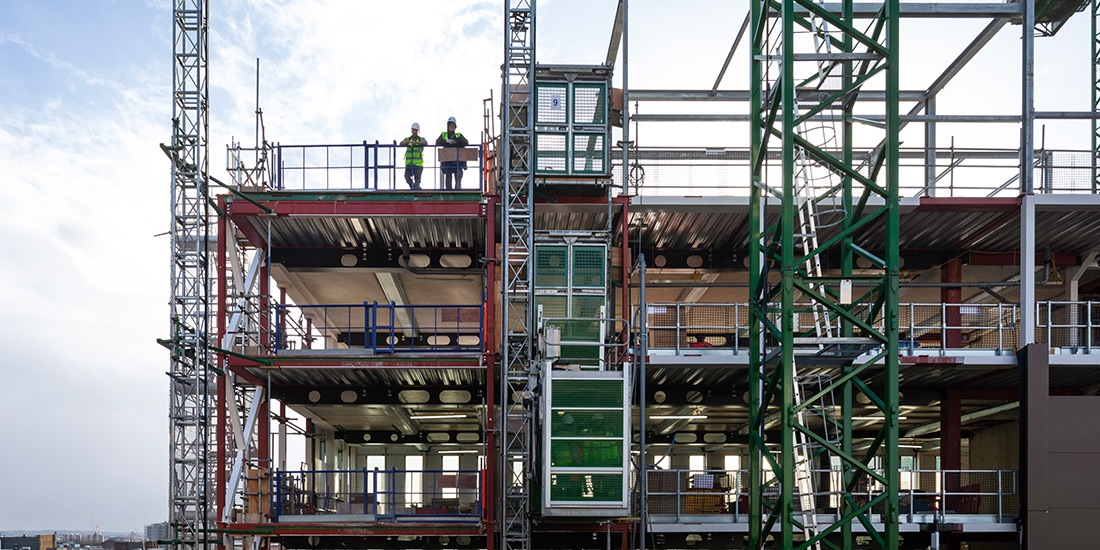Prefab Pallet shelters and dignified work address homelessness holistically
Homelessness is a complex problem; see how Pallet tackles multiple facets of the issue with temporary shelters, social services, and workforce development.

Kimberly Holland
November 30, 2022 • 9 min read
To confront homelessness, Pallet—a Washington–based public benefit corporation—deploys temporary housing communities in conjunction with municipal efforts.
The quickly erected, prefab structures provide safety and community while individuals transition from homelessness.
A holistic approach to ending homelessness includes building an inclusive workforce; the majority of Pallet’s staff have direct experience with homelessness or associated risk factors.
Across the globe, nearly 1.6 billion people lack adequate shelter. In the United States, more than a half-million are unhoused.
Unfortunately, this crisis is growing, and the cost of building permanent shelters is higher than ever. Labor and supply shortages complicate the issue. By 2025, the construction industry could face a shortage of 2 million workers.
But in the United States, permanent-housing interventions have grown by 450% in the past five years, as cities and states struggle to solve the problem and to move homeless individuals into stable housing and careers.
As part of this fight, an Everett, WA–based company has a scalable product and workforce model to build the bridge to permanent housing and dignified work. Pallet, an Autodesk Foundation portfolio organization, is a public benefit corporation that creates rapid-response shelters to bring the safety and security of a home to the most vulnerable populations. The shelters, and villages they comprise, are deployed in a matter of hours and days, not months or years.
“We need a solution now so that people aren’t dying in the elements on the streets,” says Pallet Founder and CEO Amy King. “So the rapid deployment has to do with life-saving measures.”
King advocates for housing as a human right. “Housing in and of itself is hard to build and really expensive,” she says. “We know that because we build that.” King and her husband also founded Square Peg, a general construction company. They’re all too familiar with the rising material costs and labor shortages that make building permanent homes expensive and time intensive.

More than just shelter
Creating shelter is just the foundation to Pallet’s comprehensive support model, which combines the security of reusable shelters with the work of local service providers and cities to create temporary villages to address displacement.
The original Pallet shelter design was created in 2016. The company employs an in-house engineering and design team, which incorporates the lived expertise feedback of end users. “That means all products are designed in-house and are constantly evolving to ensure we are meeting market needs,” King says.
Today, Pallet is on the eighth generation of its shelter, and the engineering changes with each successive model come directly from feedback of community members living in the units. Pallet is focused on light, nonindustrial manufacturing, primarily performing fabrication and product part assembly. For this, it uses Autodesk Inventor and Vault and is “actively working now to determine the best-use case for integration as we pursue efficiency and continue to expand product offerings,” King adds.
The temporary communities offer shelters with doors that lock; onsite social services; and access to food, showers, and laundry. Plus, the population Pallet serves can bring pets and personal possessions to their new, temporary homes. Partners are also welcomed to stay together. These humane elements may seem commonplace but are often not present in many shelter systems, which can deter individuals from seeking the help they need.
Together, the service organizations and government entities work to transition individuals in the villages to permanent housing and establish pathways to employment, which can include employment with Pallet.
Dignified work to meet growing labor needs
As much as King thinks the Pallet shelters and villages are impacting the homelessness crisis, she believes in her companies’ workforce-development model more and says other businesses should embrace it in their search to develop the next generation of employees, too.
“We have a product that’s great,” King says. “But our primary mission is to build living-wage jobs and skill sets and help people grow.”
King tells other business owners that the decision to expand their hiring sphere to include people with different, and sometimes difficult, lived experiences is one that has rewards beyond the factory floor or warehouse.
“We have to invite people into the idea that homelessness and displacement are not solved with a house,” she says. “Four walls and a roof do not solve displacement. You have to have job opportunities and economic stability. You have to have wealth generation. That’s the magic that’s going to create sustainable solutions.”
To that end, King seeks to hire people who have struggled to attain and maintain regular employment—namely, people who have experienced homelessness or addiction and those exiting the criminal justice system.
“The vast majority of our staff have significant history of justice-system involvement,” King says. “And I can tell you from experience with them—and I’ve met thousands and thousands of people with these histories that have worked for us or been in one of our programs—that they’re some of the most brilliant, intelligent, creative, productive citizens I’ve ever met.”
Through years of conversation, King says her employees and Pallet community members have shared how difficult it is to get jobs—regulations and legislation sometimes prevent people with criminal pasts from employment. Prejudice piles on the stigma, too.
“It’s this vicious cycle that people can’t get out of,” King says. “Then, they’re trapped in poverty. But for us, offering someone a job is a very simple way of saying, ‘We believe in you.’ We help train and promote them to a place where they can set dreams for themselves. Then, they’re marching down a path, and they know that they have a purpose in the world. Eventually, you’re not needed anymore. They now believe in themselves enough to stay on that path to that end point.”

King admits her message meets hesitancy from companies and managers who are reluctant to hire outside the typical employment standards. To answer that, King says policy has a place, but people have a place, too.
“The only way to break down human bias is to smash the populations together and introduce them to each other, so we try to do that,” she says. “We try to take our people into their world to tell their stories so that people can say: ‘I met someone who comes from that background. They’re an engineer at Pallet, and they make six figures, and they have a house and a kid. People can change!’ You have to provide them that example.
“As an employer, the standard used to be that you couldn’t hire anyone with a felony background ever,” King continues. “But there have to be people who come along and ask, ‘Why not?’ Because people with felonies, they’re not bad people. The vast majority of people actually respond [to rehabilitation during incarceration] and are willing to do something differently. The difference is we need someone to see them and say, ‘I see potential in you; let me spark that potential in you,’ whether it be through a job, offering them housing, a community, whatever it might be.”

Partnering with cities for long-term change
Pallet’s primary clients are cities, counties, and states experiencing a significant homelessness crisis. These groups have found Pallet’s model attractive for its low barrier to entry and holistic offering of support in overcoming some of their most difficult challenges, including site selection, housing supply, social-service connections, community adoption, and political process.
“This is a long partnership,” King says. “This is a long game. We want to help a city solve its homelessness crisis holistically. We’re usually leveraging local partners, but we’re acting as the convener to bring all the stakeholders together so that people who are displaced are getting all their needs met across the board.”
“One [partnership] in particular where we have made significant progress in our set-up process is the city of Los Angeles,” King says. “They have a huge crisis with 66,000 people living in unsheltered conditions. We had about a year of conversation, trying to figure out the mechanics of how we were going to do this in this very dense, urban environment where there’s not a lot of land availability.”
The first Los Angeles site launched in 2020, but its deployment was initially not considered to be an outright success. “Our very first site was expensive, took longer than usual to build, had a lot of challenges with the community,” King says. “But in the end, it got deployed.” That site is still operating today and has helped Pallet and the city of Los Angeles to improve future sites.
“When we moved on to site No. 2, we said, ‘Let’s work together to figure out how to make this better,’” she says. “This was really our first attempt at partnering with a city on all aspects of deployment.”
Since then, Pallet has enjoyed a close working partnership with the city’s Bureau of Engineering—a group of local architects, general contractors, and city staff—to ensure each site deployment is streamlined, cost effective, and as easy as possible.
“These new sites are about 1/16th of the cost of the first one,” King says. “We’re doing it much cheaper, and we’re getting the sites built out much faster.”

Embracing empathy and mission in business
Ultimately, King hopes the mission of Pallet could one day be fulfilled and that homelessness in the United States could be solved, whether with Pallet’s products or other solutions. For that, King will need her employees to be prepared and invested in the business and the mission.
“A lot of business owners, especially in companies that have shareholders, have a focus on profitability—and I have no issue with that,” King says. “You have to be sustainable. But we lose sight of what matters: None of that profitability is possible without people.”
King tells her fellow business leaders to always consider what their mission is and how it helps their community—and consider when that mission is more important than the bottom line.
“Recognize that there are moments in business for profitability, and there are moments for mission,” King says. “They’re often in conflict with each other. As a social enterprise, I can tell you we weigh if an opportunity is a mission moment or a profit moment. We default right now toward a mission moment because we’re trying to get market saturation to solve the problem. Other times, there is a profitability moment. If you can identify those moments as a business owner and capitalize on both, then you can both have an impact in your community and be sustainable with a healthy bottom line.
About the author

Kimberly Holland
Kimberly Holland is a lifestyle writer and editor based in Birmingham, AL. When not organizing her books by color, Holland enjoys toying with new kitchen gadgets and feeding her friends all her cooking experiments.

